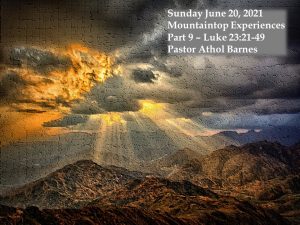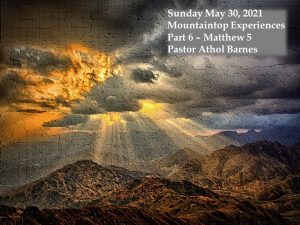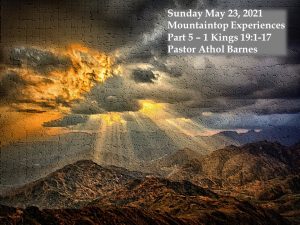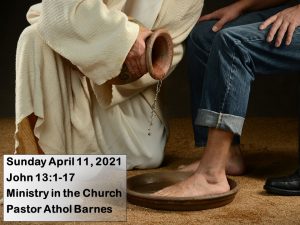
Mountain top experience’s part 11
If I were to give you a ticket to fly first class to an amazing destination, your first question would be, “where is it?”. Followed shortly by, “what can I do there?”. We would never sign up to go somewhere without doing some research on the destination, yet this is how we approach our eternal destination.
I am talking about the new Jerusalem. The enormous city that we read about in Revelation 21 will be the eternal home of all who know and love Jesus as Lord of their lives. This is the final mountain, that all others lead to and only one person has ever seen, the Apostle John in the book of the Revelation.
Since heaven or hell are the eternal destination of everyone who has ever lived, it is surprising that so little is said about heaven from our pulpits. The truth is that people fear the unknown and one of Satan’s primary objectives is to make little of Heaven. He would like to convince the world that Heaven doesn’t exist and failing that, he would try to convince the world that it will be boring and unattractive.
Randy Alcorn said, “Grasping what the Bible teaches about Heaven shifts our center of gravity and radically alters our perspective on life”.
Revelation 21 talks about the New Heaven and the New Earth that will be after the tribulation, the battle of Armageddon, the thousand-year reign of Jesus, and the great white throne judgment. This is the final eternal state that we long for, hope for, and all creation is crying out for.
In Revelation 21:10, The apostle John tries his best to describe something that is impossible to capture and describe with words. The description of this city almost defies imagination. The earth is renewed at this stage, it is completely remade, as Jesus says in verse 5 of Revelation 21, “Behold, I am making all things new.”
The structure of the earth and the atmosphere is not limited to our understanding, it will be made new. The New Jerusalem is huge, it is a cube of around 1400 miles in all directions. It has been calculated that a structure this size can house billions of people. In fact, easily all the people that have ever lived on the planet.
This city unites the Old Covenant and the New Covenant that God made with mankind. The twelve gates are identified with the twelve tribes of Israel, and the twelve foundations with the twelve Apostles.
Heaven is defined as the place where God dwells, making this city Heaven itself. Verse 22 says, “And I saw no temple in the city, for its temple is the Lord God the Almighty and the Lamb. The New Jerusalem is incredibly beautiful and filled with all kinds of precious jewels and metals. The New Jerusalem is the ultimate fulfillment of all God’s promises.
Just like it is impossible for us to describe God using our vocabulary and things we can identify with, so to it is impossible to fully describe heaven. We also want to understand heaven through the lens of what brings us pleasure here on earth, and we simply cannot do that, because we live in a world tainted by the effects of sin. Heaven will be filled with pleasures that are infinitely more real and lasting than anything we know here in this lifetime.
But the primary joy of heaven will not be the state of our being, the weather, or the experiences we will taste. The primary pleasure of heaven will be the presence of God.
We are designed to have communion with God. God created man in his own image, to have fellowship with him. However, when sin entered the world, that relationship was broken and there was a separation that took place. Inside every human being is a longing and an unfulfilled desire that can only be met by the perfect presence of God Himself.
Being in the presence of God for eternity is heaven and being separated from God for eternity is hell. Our selfish and humanistic mindset cannot even begin to grasp what it will be like to be in the presence of God and to worship Him. In our, “what’s in it for me” culture, we have no idea what it will be like to be in the presence of the Creator of the universe. Heaven will be primarily a place filled with the glory of God (Revelation 21:23). Heaven will also be a place of service and work. God is creative and He designed us to be creative beings along with Him. We see in Genesis 1, that God created man to rule and care for the creatures of the earth.
The Old Testament references this holy mountain frequently in the Psalms and the prophets (see, Zechariah 8:3., Psalm 48:1-2, Isaiah 2:1-2 and Micah 4:1-5).
As we have gone through this series for the past ten weeks, we have seen that all the mountaintop encounters lead to this incredible mountain of God.
So, who gets into heaven? In Revelation 21:7-8, we have a clear list of people who will not enter into the presence of God. The list is quite comprehensive, so how can we know for sure that we are going to heaven?
Romans 10:9 says, “if you confess with your mouth that Jesus is Lord and believe in your heart that God raised him from the dead, you will be saved.”
Submitting your life to the lordship of Jesus Christ, being clothed in his righteousness is the only way to be granted access into heaven. Have you submitted to the lordship of Jesus?










